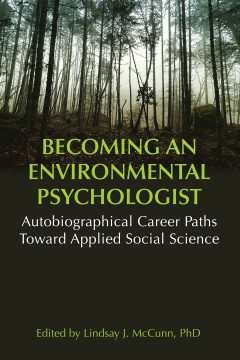Becoming an Environmental Psychologist
Autobiographical Career Paths Toward Applied Social Science.
Edited by Lindsay J. McCunn
Other Formats Available:
- About This Book
- Reviews
- Author Information
- Series
- Table of Contents
- Links
- Podcasts
About This Book
This book explores the interdisciplinary pathways that leading environmental psychologists have taken to become educators, researchers, consultants, and professionals in this highly applied and growing field. Environmental psychology examines the transactions between people and the built and natural settings in which they inhabit. Despite this broad scope, few direct avenues to careers in environmental psychology exist, and students must forge varied and individualized routes to becoming scholars and practitioners in this important area of study.
The aim of the book is to serve as an inspiring supplemental resource for students who wish to know more about how leading thinkers established themselves as environmental psychologists. In each chapter, the author describes their inspirations, decisions about undergraduate and graduate courses, particular schools, and professional connections that have made a difference to their careers in environmental psychology. Many undergraduate students are disappointed with the lack of a clear path to becoming an environmental psychologist. A strong need exists for a resource like this book for students (and for others who may be looking to add to their careers) to understand how to gain experience and credentials in the field in different ways. Readers may also be bolstered in their attitude about choosing a niche field like environmental psychology and decide to stick with it if they read the success stories published in this book by leading thinkers who have taken varied and atypical approaches to becoming a professional environmental psychologist.
The book’s chapters are organized in a manner that shows readers how one may come from many different backgrounds and integrate environmental psychology into their education or professional realm. Part I contains chapters in which authors write about how they approached environmental psychology from architecture, urban planning, and geography, while Part II includes chapters from authors who found environmental psychology via cognitive psychology, clinical practice, and neuroscience. Part III has chapters from authors writing from the health sciences and social ecology, while Part IV contains chapters by authors inspired to become environmental psychologists through a general appreciation of nature and eco-conscious living in a variety of settings. Those who find a way to make environmental psychology part of their career are often very passionate individuals who are keen to describe their pathway to doing what they love with the hope that others will follow. This book is likely to advance that outcome
Reviews
“This book promises to broaden the future horizon of environmental psychology by articulating what it is and why it matters. Drawing on the unorthodox career paths of some of the most reputable scholars in the field, it inspires a new generation of aspiring scholars about what’s possible and how to start that journey. The stories within are funny and joyful and describe the twists and turns of scholars crossing over disciplines to reach their goals. It is vital that environmental psychology grows since it really can help humanity and the world with many of our biggest challenges. This book is an important step in catalyzing that growth and in encouraging diversification in the field. It should be mandatory reading in schools of psychology, architecture, urban planning, public health, psychiatry, and more, where it will spark a new wave of environmental psychologists.” — Jenny Roe, Director of the Center for Design & Health, University of Virginia, USA
“This book presents a rich tapestry of career trajectories narrated by leading scholars in environmental psychology and environmental design research. The authors offer provocative insights about the personal and situational circumstances that shaped their career choices and the lines of research they (and often their students) chose to pursue over multiple decades. A fascinating read for anyone who has participated in environment-behavior research or is contemplating a career as an environmental psychologist. Highly recommended!” — Daniel Stokols, Chancellor’s Professor of Social Ecology, University of California, Irvine, USA
“Honest. Inspiring. Personal. Bold. A collection of stories from explorers in the field of environmental psychology.” — P. Wesley Schultz
Author Information
Lindsay J. McCunn, PhD, is a Professor of psychology at Vancouver Island University and the co-Editor-in-Chief of the Journal of Environmental Psychology. Her applied research has been published in a number of interdisciplinary journals and books concerning architecture and engineering, community planning, design, and education.
Series
Table of Contents
Introduction - Lindsay J. Mccunn; Part I. Pathways To Environmental Psychology From Architecture, Urban Planning, And Geography; Part II Pathways To Environmental Psychology From Cognitive Psychology, Clinical Practice, And Neuroscience; Part III. Pathways To Environmental Psychology From The Health Sciences And Social Ecology; Part IV. Pathways To Environmental Psychology From An Appreciation Of Nature And Eco-Conscious Living; Concluding Remarks - Lindsay J. Mccunn; Notes On Contributors
Links
Stay Updated
Information
Latest Tweets



